- Home
- Charles L. Grant
Shadows 3 Page 15
Shadows 3 Read online
Page 15
But when he began to talk, the odd things were there.
As Margaret Lockwood was putting Robbie to bed one evening, he suddenly squirmed in her arms. She almost dropped him and had to set him quickly on his feet before he fell. As soon as he was on the floor, Robbie looked up into her face and smiled happily.
“Daddy,” he said. “Flashlight.”
Margaret Lockwood crouched in front of her lovely son and put her hands gently on his shoulders to hold him in place.
“What, Robbie?” she said.
“Daddy,” Robbie said again, his smile widening, lighting up his face. “Daddy have flashlight.”
Then he turned and scampered off to his room.
His mother rose and followed him into the nursery. While she was getting him ready for bed, she said again—gently, lightly, coaxingly, “Does Daddy have a flashlight?” She kept smiling.
Robbie ignored her and amused himself by trying to pull the sheet loose from the mattress.
“Robbie, does Daddy have a flashlight?”
But Robbie’s mind was far away, his ears deaf to her question. Margaret Lockwood was certain that Robbie knew nothing of any flashlight Daddy might have at the moment. She was uncertain if Robbie had ever used the word “flashlight” before. She thought not.
David Lockwood was a fireman and that week he was working the night shift. When he worked nights, it was his habit to call Margaret from the firehouse around midnight-timing it carefully not to interrupt her 11:00 news or Johnny Carson’s monologue—to let her know that everything was all right, and to say good night. They missed each other when he had to work nights.
When David called that night, Margaret was dozing on the couch while the television chuckled at her. The phone startled her awake. She had it to her ear before she realized it was David making his nightly call.
“Quiet tonight,” David said. “We only had one alarm all evening. Some old lady’s frozen pizza went up in smoke in her oven. Only took us about ten minutes.”
“Oh, good, David,” Margaret said. She was yawning.
“What took time was getting back to the house. The damn truck broke down and yours truly ended up squiggling around underneath it for half an hour. And that truck’s not exactly built like the Volks. But I got it—”
“Your truck broke down?”
“Yeah. But relax, honey, it was no big deal. We lost a hose, that’s all. The only problem I had was getting at the damn thing. Took me—”
“Where were you when it happened?”
“Where? Oh, somewhere on Route 18. We were on our way back.”
Margaret had stopped yawning. “Was it dark?”
David laughed. “Nah, the sun came out and shone right on the bottom of the truck. Honey, of course it was dark. And just for good measure, two of the flashlights went dead.”
“But you had one? I mean, you had one?”
“Yes, I had one. Margaret? Is something wrong? You sound strange.”
When David returned home a little after 4:30, he found Margaret asleep on the couch instead of in bed. The television was still on, the voices turned down to a distant blur of human sound, just enough to keep her company in the night.
It was just an odd coincidence, they decided in the morning.
But it was not. In the next few months they realized that Robbie really did see things. Odd things.
A few months after this third birthday, Robbie began talking to an imaginary playmate called Alec. He would sit out on the lawn or the front steps or in the back yard and mumble away happily to himself for hours on end, apparently chatting with the invisible Alec. When Margaret’s girl friends and neighbors came in for coffee, they commented, smiling, and Margaret would laugh with them. Oh, she would say, Alec was a godsend, she didn’t know what she would do without him. He kept Robbie busy for hours at a time without a grumble. Better than television for keeping him occupied and out of her hair. He was the best baby-sitter in the world. And the price was right. And he didn’t have to be driven home afterwards.
Occasionally she would notice on Robbie’s face a look of rapt attention as he appeared to be listening to Alec. She assumed it was Alec. There were moments when it bothered her a bit. But her girl friends’ children had imaginary playmates too. Some of them did. A few of them.
But it really didn’t bother Margaret Lockwood a great deal. At least it didn’t bother her anymore than Robbie’s seeing things. In fact, the only thing that bothered her at all was the fact that Alec, it seemed, never came into the house. And the only reason that fact got even that much of her attention was that she could have used his help sometimes in the evening to keep Robbie company. The boy was now at an age where he was constantly on the move, exploring, poking into everything, his curiosity and his imagination both working overtime. By evening, Margaret was often exhausted. She wanted Robbie in bed and the evening to herself, especially when David was working nights. In fact, with Robbie at this active stage, she welcomed the evenings alone. After dinner, she would kiss David good-bye and put Robbie to bed and actually look forward to spending the evening alone, relaxing with a magazine or dozing in front of the television. On those evenings, she seemed to sleep so much better on the couch than she ever did in bed. And she still got a normal night’s sleep.
But Robbie, refreshed from an afternoon nap, was often a bundle of energy in the evenings. Or, even without the nap, he was too excited, too overactive, too overtired, too something, to fall asleep immediately.
On those evenings, Margaret wished Alec would come inside. She would try to coax Robbie into imagining the invisible friend right there in the nursery, right there beside him. But Robbie wouldn’t have it. She had no luck. Alec, it seemed, would not set foot—if that was the right word for it—inside the house. No Alec. And little rest for Margaret Lockwood that night.
On those evenings, she wished fervently that Robbie would see Alec inside the house.
But he would not.
One day Robbie was standing in the middle of the back yard and his mother thought there was something odd about the way he was standing and … looking? She couldn’t be sure. She started outside, then grabbed quickly at the screen door to keep it from slamming behind her. Robbie’s back was turned. He was staring at the fence at the back of the yard and had no idea his mother was watching him. It was the angle of his head that had caught her eye. It was cocked curiously to one side with the unabashed honesty of children.
He just stood, feet apart at an awkward angle, as if he had been running and had been forced to a sudden halt. By what? His body was still, frozen, head tilted to one side. Margaret Lockwood watched her son. She knew that Robbie was seeing something. Suddenly Robbie whirled and ran back toward the house. His eyes were wide. They flew open wider as he spotted her in the doorway. His little legs pumped hard across the manicured grass of the yard, up the brick steps, into the waiting arms of his mother.
“Did something frighten you, Robbie?” she said, her voice already crooning, comforting, accustomed to banishing the fears of childhood.
Robbie stood stiffly in her arms, his body leaning back and away from her slightly.
“Alec …” he said. And stopped.
She touched the back of his head, the back of his neck.
“What about Alec, honey?”
Robbie’s eyes widened in childish astonishment.
“He walked through the wall.”
Margaret Lockwood looked into her son’s face.
“He walked through the wall,” Robbie said again. His voice expressed amazement as only a child’s can: amazement unparalleled and beyond a child’s powers to feign.
“He walked through the wall?” his mother said, her voice flitting between disbelief, encouragement, and fright.
Robbie’s head bobbed up and down. “Yup,” he said, “right through the wall.”
Three weeks after Robbie saw Alec walk through the wall, the boy came running inside to his mother shortly after she had sent him out to
the yard to play. She was sitting at the kitchen table, having another cup of coffee and listening to the radio as Robbie came crashing into the house. She spilled coffee all over the table and had to grab at the boy to keep him from being splashed and burned.
“Mommy! Mommy!”
He had to catch his breath before he could tell her why he was so excited.
“Robbie, what is it?”
His eyes were gleaming. “Alec …” he said.
He stood there, panting heavily.
“Robbie!”
He took a step backward, away from his mother.
“Robbie, what’s wrong? Robbie!”
The boy was solemn-faced now, his eyes openly gazing at her. With curiosity? If Robbie had been older, his mother would have described the look on his face as “speculative,” as if he were weighing possibilities, making some sort of judgment. But Robbie was only three, too young for anything like that. Much too young.
“Nothing,” he said. And he was gone, the kitchen door left to slam loudly behind him.
Margaret Lockwood jumped from the table to follow her son. As she moved, she spilled the remaining coffee from her cup. She swore, hesitated, stopped to wipe it up quickly. By the time she got to the back yard in search of Robbie, the boy was playing with one of his trucks. It was a big red fire engine, made of heavy-gauge steel and weighing, Margaret Lockwood often thought when she had to move it, almost as much as Robbie himself. Its value, David had explained when he brought it home, was in the authenticity of the details. It was fitted with a little seat on top and could be wheeled, slowly, by a boy of Robbie’s age and strength. Robbie was sitting on it now, leaning forward, fingers gripping the cab of the truck, knees and legs straining to push it through the grass of the yard. The boy didn’t see her; the truck and its weight absorbed all his attention.
Margaret Lockwood stood in the doorway for a moment, watching him, then let the door close silently. Through the screen she continued to watch her son. After a while she decided not to go outside. Robbie was lost in his play with the truck. He would push it a foot or so—two good shoves with his sturdy legs—then stop to rest Each time he stopped, he would look back over his shoulder, as if he were looking up into somebody’s face, almost as if he were seeking approval for how he had moved the heavy truck. Each time he did it Margaret Lockwood could see his lips move, but she couldn’t hear what he was saying. Of course it didn’t matter. Robbie was talking to Alec.
That evening she spoke to her husband about Robbie. She told him about the episode that morning. She told him about some of the other strange things that had happened in recent months, as many as she could remember, ones that she had not mentioned to him at the time they occurred. She told him some things that might not have been episodes at all, just little things that, for some reason, had made her uneasy for a moment. She told him everything she could think of about Robbie that had struck her, even for an instant, as strange. She told him about Alec, about Alec walking through the wall, and how she believed it, believed it because Robbie himself had been genuinely puzzled, about how Robbie talked to Alec when he rode the fire truck, about how Alec would not come into the house, no matter how much she coaxed. She told David everything.
He did not exactly make light of it but he saw no cause for concern either. Children have incredible imaginations, he said, remember that And Robbie’s imagination is more vivid than most kids’, remember that too. And lots of kids have an imaginary playmate. Kids are different he said, they have no control over their imaginations, they see things, hear things, stuff like that and there’s‘ no reason anything like that should ever bother you. And besides, he’ll grow out of it.
Margaret said she guessed he was right. They were standing side by side at the stove, both of them putting dinner on the table. Robbie was in the living room.
“And, you know,” David said, “you’re beginning to talk about this Alec as if you really did believe in him.”
Margaret, relieved at having gotten it all out told it all out loud, laughed and said, “No Alec, huh?”
“No Alec.”
She shrugged. “Okay, then,” she said. “No Alec.”
That was on Friday.
On Monday, David went back to working the night shift for a week.
On Monday evening, Margaret fed husband and son, then sent David off to work with a kiss. She stayed at the door until she saw the car disappear around the corner. Then she went inside to put Robbie to bed. She was relieved when he seemed to fall asleep at once.
When she returned to the kitchen, it was beginning to rain. She flicked on the yard lights for a second to see what had been left outside that might rust. Her eyes swept the yard. There was nothing. She took her time cleaning up after dinner. No rush tonight. Robbie was already asleep. Before she settled in front of the television with a bowl of Jell-O, she went around the house and made sure all the windows were closed. It was raining hard now.
The crash and scream from the bedroom sent her leaping off the couch. The glass bowl flew out of her hand. Her knee caught the edge of the coffee table. Pain shot through her leg.
Robbie!
She ran for the bedroom, stumbling against the wall, her injured knee barely supporting her.
“Robbie?!”
The boy was standing in the crib, his hands gripping the top of the side, fingers curled tightly around the bar. He was looking past her, his gaze fixed.
“Robbie!”
She ran for him, swept him up out of the crib into her arms. She almost had to pull his hands free from the railing. As she gathered him in close to her pounding heart, his head swung away from her. He was still staring into the comer of the room beside the door.
Margaret patted him on the back, stroked him, soothed him.
“What happened, baby? What happened? Tell Mommy what happened?”
She turned from the crib to walk up and down the room with him, as she had done when he was an infant.
“Tell Mommy what happened.” She repeated the words over and over. “Tell Mommy what happened.” She kept her face close to the boy’s silken hair. “Tell Mommy what happened.”
“Alec came inside,” Robbie said at last.
Margaret’s knee hurt more now. She had forgotten it the instant Robbie was safely in her arms, but now the pain burned through her leg, shot down through the bone. She stumbled and had to tighten her grip on the boy as she turned toward the door. Robbie was squirming in her arms. She lost her balance and bumped her shoulder against the doorframe.
She carried Robbie out to the living room. He was stiff in her arms for a moment, as if reluctant to come, but he began to relax when she settled him on the couch beside her. She couldn’t hold him in her lap the way she wanted because of the pain in her leg. She thought she could feel the knee already beginning to swell. She tried but she could coax nothing out of Robbie about what had happened, what the noise was, what had made him scream. His only response was a shrug. She felt him all Over, his arms and legs, and looked in his eyes, felt his forehead. He was fine. But her examination of him made her realize even more strongly how much her own leg was hurting. It was more than half an hour now since she had struck it and the swelling was now painful itself.
It was almost another half hour before Robbie finally grew drowsy and Margaret felt it was safe to leave him alone on the couch. She made sure he wasn’t going to wake up, then hobbled off to the kitchen for ice. She improvised an ice pack with a dish towel and started back to the living room.
But what had happened? She was sure she had heard a crash at the same instant Robbie had screamed. Or had she dreamed it? The rain was still lashing at the windows. She could hear the trees whipping in the wind. Maybe a branch had snapped outside. She’d been distracted by the television when it happened. Maybe her mind had joined all the sounds together.
Robbie was safely asleep on the couch. Margaret supported herself against the wall for a moment, then hobbled slowly down the hall to take one more
look in the bedroom, just to be sure.
She flipped on the bright overhead light. Her gaze swept carefully around the room, cataloguing everything in its place, until she came to the corner at her left side.
The red fire truck was in the corner, the front end of it crushed against the wall. The wall itself was split with the impact. The ladders had flown off the truck and lay nearby. One of the wheels had come off. Another was bent askew on its axle and the remains of the truck leaned sideways. The front cab was mangled on one side, crushed almost flat on the other. A red stain soaked the rug beneath it.
“Oh my God!” Margaret said.
Alec came inside.
Then she heard the doorbell ring.
Introduction
Steve Rasnic Tem is a poet, short story writer, and newlywed. I must say that those marble town halls with those long, door-studded corridors, have always held a certain morbid fascination for me. I don’t know why. And this piece doesn’t help me feel any easier about it.
AT THE BUREAU
by Steve Rasnic Tem
I’ve been the administrator of these offices for twenty-five years now. I wish my employees were as steady. Most of them last only six months or so before they start complaining of boredom. It’s next to impossible to find good help. But I’ve always been content here.
My wife doesn’t understand how I could remain with the job this long. She says it’s a dead end; I’m at the top of my pay scale, there’ll be no further promotions, or increase in responsibilities. I’ve no place to go but down, she says. Her complaints about my job always lead to complaints about the marriage itself, of course. No children. Few friends. All the magic’s gone, she says. But I’ve always been content.
When I started in the office we handled building permits. After a few years we were switched to peddling, parade, demolition licenses. Two years ago it was dog licenses’. Last year they switched us to nothing but fishing permits.

![[Oxrun Station] The Orchard Read online](http://i1.bookreadfree.com/i/03/17/oxrun_station_the_orchard_preview.jpg) [Oxrun Station] The Orchard
[Oxrun Station] The Orchard![Riders in the Sky - [Millennium Quartet 04] Read online](http://i1.bookreadfree.com/i/03/20/riders_in_the_sky_-_millennium_quartet_04_preview.jpg) Riders in the Sky - [Millennium Quartet 04]
Riders in the Sky - [Millennium Quartet 04]![Chariot - [Millennium Quartet 03] Read online](http://i1.bookreadfree.com/i/03/19/chariot_-_millennium_quartet_03_preview.jpg) Chariot - [Millennium Quartet 03]
Chariot - [Millennium Quartet 03]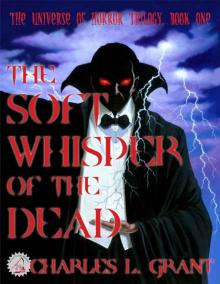 The Universe of Horror Volume 1: The Soft Whisper of the Dead (Neccon Classic Horror)
The Universe of Horror Volume 1: The Soft Whisper of the Dead (Neccon Classic Horror)![[Oxrun Station] Dialing The Wind Read online](http://i1.bookreadfree.com/i/03/19/oxrun_station_dialing_the_wind_preview.jpg) [Oxrun Station] Dialing The Wind
[Oxrun Station] Dialing The Wind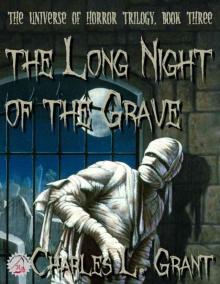 The Universe of Horror Volume 3: The Long Night of the Grave (Neccon Classic Horror)
The Universe of Horror Volume 3: The Long Night of the Grave (Neccon Classic Horror) The Grave - An Oxrun Station Novel (Oxrun Station Novels)
The Grave - An Oxrun Station Novel (Oxrun Station Novels)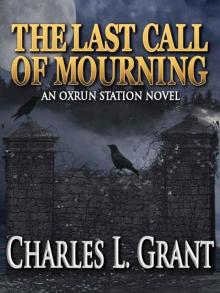 The Last Call of Mourning - An Oxrun Station Novel (Oxrun Station Novels)
The Last Call of Mourning - An Oxrun Station Novel (Oxrun Station Novels) The Complete Short Fiction of Charles L. Grant, Volume IV: The Black Carousel
The Complete Short Fiction of Charles L. Grant, Volume IV: The Black Carousel The Bloodwind - An Oxrun Station Novel (Oxrun Station Novels)
The Bloodwind - An Oxrun Station Novel (Oxrun Station Novels)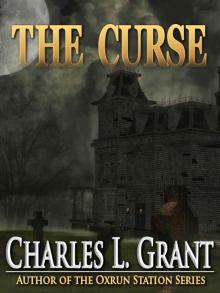 The Curse
The Curse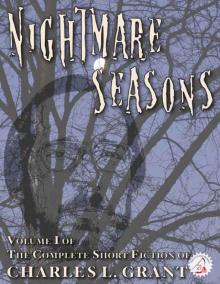 The Complete Short Fiction of Charles L. Grant Volume 1: Nightmare Seasons (Necon Classic Horror)
The Complete Short Fiction of Charles L. Grant Volume 1: Nightmare Seasons (Necon Classic Horror)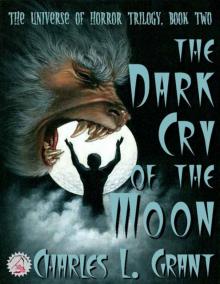 The Universe of Horror Volume 2: The Dark Cry of the Moon (Neccon Classic Horror)
The Universe of Horror Volume 2: The Dark Cry of the Moon (Neccon Classic Horror) Watcher: Based on the Apocalypse (World of Darkness : Werewolf)
Watcher: Based on the Apocalypse (World of Darkness : Werewolf)![[Oxrun Station] The Bloodwind Read online](http://i1.bookreadfree.com/i/03/25/oxrun_station_the_bloodwind_preview.jpg) [Oxrun Station] The Bloodwind
[Oxrun Station] The Bloodwind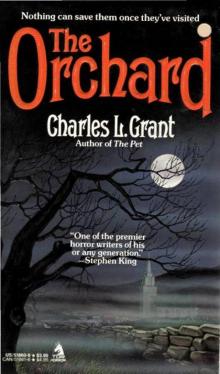 The Orchard
The Orchard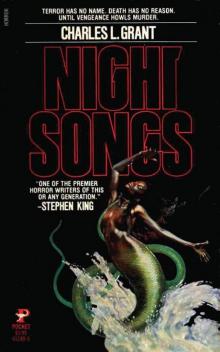 Night Songs
Night Songs Shadows 3
Shadows 3![Symphony - [Millennium Quartet 01] Read online](http://i1.bookreadfree.com/i1/04/02/symphony_-_millennium_quartet_01_preview.jpg) Symphony - [Millennium Quartet 01]
Symphony - [Millennium Quartet 01] The Hour of the Oxrun Dead (Necon Classic Horror)
The Hour of the Oxrun Dead (Necon Classic Horror)![In the Mood - [Millennium Quartet 02] Read online](http://i1.bookreadfree.com/i1/03/31/in_the_mood_-_millennium_quartet_02_preview.jpg) In the Mood - [Millennium Quartet 02]
In the Mood - [Millennium Quartet 02] The Complete Short Fiction of Charles L. Grant Volume 3: Dialing the Wind (Neccon Classic Horror)
The Complete Short Fiction of Charles L. Grant Volume 3: Dialing the Wind (Neccon Classic Horror)![[Oxrun Station] The Last Call of Mourning Read online](http://i1.bookreadfree.com/i2/04/05/oxrun_station_the_last_call_of_mourning_preview.jpg) [Oxrun Station] The Last Call of Mourning
[Oxrun Station] The Last Call of Mourning The Pet
The Pet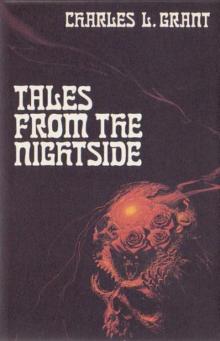 Tales from the Nightside
Tales from the Nightside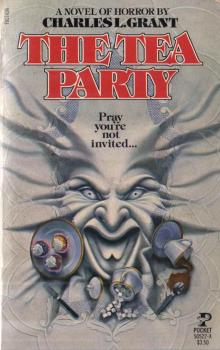 The Tea Party - A Novel of Horror
The Tea Party - A Novel of Horror The Complete Short Fiction of Charles L. Grant Volume 2: The Orchard (Necon Classic Horror)
The Complete Short Fiction of Charles L. Grant Volume 2: The Orchard (Necon Classic Horror) Whirlwind
Whirlwind Jackals
Jackals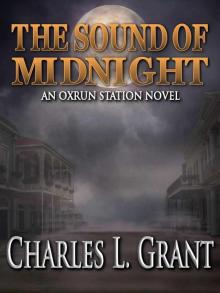 The Sound of Midnight - An Oxrun Station Novel
The Sound of Midnight - An Oxrun Station Novel